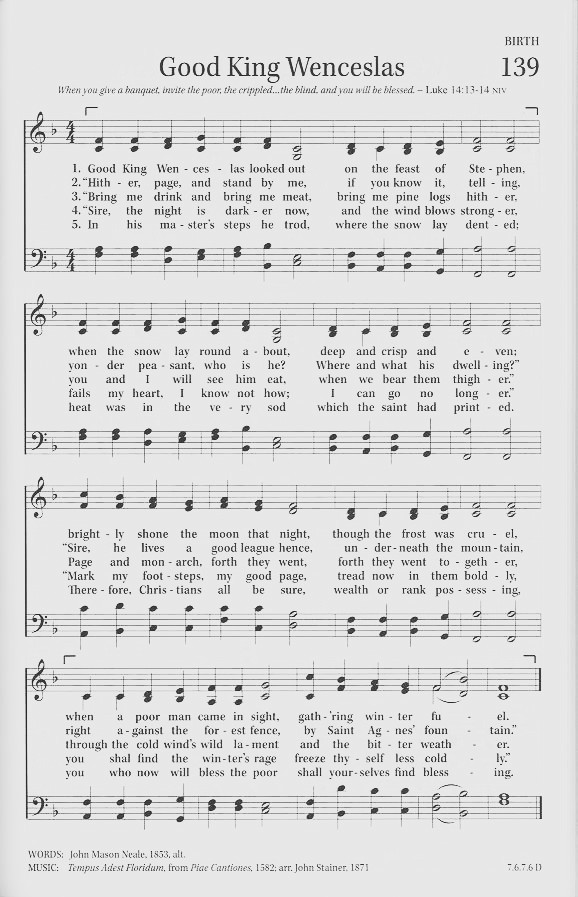Good King Wenceslas
By J. M. Neale
Lyrics
When the snow lay round about, deep and crisp and even.
Brightly shone the moon that night, though the frost was cruel,
When a poor man came in sight, gath’ring winter fuel.
Yonder peasant, who is he? Where and what his dwelling?”
“Sire, he lives a good league hence, underneath the mountain,
Right against the forest fence, by Saint Agnes’ fountain.”
You and I will see him dine, when we bear them thither.”
Page and monarch, forth they went, forth they went together,
Through the cold wind’s wild lament and the bitter weather.
Fails my heart, I know not how; I can go no longer.”
“Mark my footsteps, my good page, tread now in them boldly,
You shall find the winter’s rage freeze your blood less coldly.”
Heat was in the very sod which the saint had printed.
Therefore, Christian men, be sure, while God’s gifts possessing,
You who now will bless the poor shall yourselves find blessing.
Bible Reference
Matthew 25:40
About This Hymn
“Good King Wenceslas” is a Christmas carol written by Anglican priest and hymnologist John Mason Neale in 1853. The lyrics recount the story of Saint Wenceslas I, the 10th-century Duke of Bohemia, known for his piety, humility, and care for the poor. Neale’s carol was originally paired with a 13th-century spring carol tune, “Tempus adest floridum,” from the Piae Cantiones collection published in 1582. In this song, Wenceslas is depicted venturing out into harsh winter weather to bring food, firewood, and warmth to a poor peasant on the Feast of Stephen, which is celebrated on December 26. The carol serves as a vivid narrative of Christian charity, encouraging believers to serve Christ by caring for those in need.
The story’s moral message aligns closely with Scripture, especially Christ’s words in Matthew 25, where He teaches that acts of kindness toward “the least of these” are acts of service to Him. While Neale romanticized Wenceslas’s deeds, his retelling helped introduce English-speaking audiences to the historical duke, who was revered as a martyr and saint in Bohemia. Wenceslas was assassinated by his brother in 935 but quickly came to be regarded as a Christian ruler whose life reflected holiness and humility. The carol’s narrative style, combined with its medieval melody, gives it a timeless quality that reinforces the enduring Christian virtues of generosity, sacrifice, and service.
Over the years, “Good King Wenceslas” has remained a beloved part of Christmas celebrations, particularly in Anglican and other Protestant traditions. Its emphasis on practical acts of charity offers a refreshing perspective amidst the festive season, reminding listeners that true celebration of Christ’s birth is demonstrated through love and service. The carol’s structure, with alternating verses between the King and his page, adds dramatic storytelling, making it engaging for choirs and congregational singing. Today, it remains one of John Mason Neale’s most famous works, standing alongside his other contributions such as “O Come, O Come, Emmanuel” and “Good Christian Men, Rejoice.” Through this hymn, Neale successfully wove together medieval history, biblical truth, and folk melody into a timeless call for Christian discipleship.


📬 Subscribe to Our Devotional Updates
Receive weekly hymns, devotionals, and website features directly in your inbox.
Hymn Information

- Category: Hymn
- Author/Writer: J. M. Neale (1853)
- Added: August 25, 2025
- Last Updated: August 25, 2025
- Views: 3148
MIDI File
Popular Hymns
Recent Blog Posts
Popular Blog Posts
Visit Us on Social Media
Latest from X (Twitter)
Tweets by HymnalLibraryLatest from Facebook
Latest on YouTube
Daily Bible Verse
Disclaimer
The hymns, sheet music, MIDI files, and related content on this website are provided for educational and research purposes only.
- Public Domain: Many of the hymns featured here are in the public domain and may be freely used.
- Copyrighted Works: Some hymns may still be under copyright protection. Where applicable, permission has either been requested from the copyright owner, or the content is shared under the principles of fair use for educational purposes.
⚠️ Important Notice: If you wish to reproduce, distribute, or use any copyrighted hymn beyond personal study or educational use, you must obtain permission directly from the copyright holder. This website does not grant any rights for commercial use yet.
If there is any other question please address it to us in our Contact Page, for further assistance. Thank you for using the site. May God Bless You.












